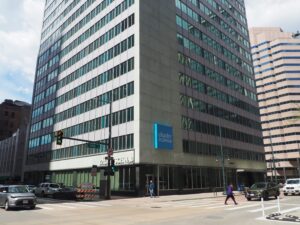
Denver Assessor Keith Erffmeyer speaks at BusinessDen’s “The Future of Office Event” on Sept. 10, 2024. (Matt Geiger/BusinessDen)
The Denver official tasked with valuing the city’s real estate said Tuesday that office building valuations will likely bifurcate this cycle, with top-tier properties holding steady while less-desirable properties see significant declines.
“I think we’ll see a spreading of value unlike I’ve ever seen in Denver, going all the way from downtown to the Tech Center — Cherry Creek seems to be immune to anything, so that might not happen here — but that’s kind of what we’re looking at, is really a two- if not three-tier market,” Assessor Keith Erffmeyer said.
Erffmeyer made the comment at BusinessDen’s “The Future of Office” event, where he and five real estate executives discussed the office sector’s status and outlook. The event was held at the Clayton Hotel & Members Club in Cherry Creek.
County assessors in Colorado value real estate every two years, and the figure directly translates to what an owner pays in property taxes. New valuations go out in May of odd years, and are based on the two-year period ending the previous June. The next notices of valuation will go out in May 2025.
This is the third valuation cycle since the pandemic hit in 2020. But Erffmeyer noted the previous two cycles had few data points to go off when valuing office properties.
“In 2021, our data value was June of 2020, so we were barely three months into the pandemic at that time,” he said. “And frankly, we didn’t know what the world was going to look like, what offices were going to look like, what schools were going to look like, what anything was going to look like. We did our best, quite frankly, to take the sales that preceded Covid and adjust them down for the uncertainty, the risk.”

The 24-story Denver Club building at 17th and Glenarm sold in late 2022 for $52.80 a square foot. (BusinessDen file)
The next cycle didn’t offer much more, as continued uncertainty around the sector resulted in few building transactions.
That’s changed somewhat in the last couple years. Buildings such as downtown’s Denver Club and The 410 have sold for cheap, while structures at 1401 Lawrence and Platte Street’s Riverview have fetched more respectable sums. The Denver Tech Center is also seeing transactions.
Erffmeyer joined the Denver assessor’s office as an intern in 1994 and assumed the top job in 2014. He noted he’s worked to value properties through the Great Recession and the dot-com bust.
“And this revaluation might be the toughest of all of them, just because there’s so many almost conflicting and just dissonance in terms of what we see in terms of sale prices — just in downtown, much less throughout, in my case, Denver, and, speaking for the other assessors, throughout the metro area,” he said.
“Prime” buildings — which tend to be newer and have top-tier locations — will “probably be just fine in terms of value, maybe even see some increases in terms of value,” Erffmeyer said. But as buildings age, “there comes a tipping point somewhere in there where it’s not a prime building anymore.”
“And that’s when we start seeing this kind of bifurcation,” he said. “I’ve heard falling off a cliff, things like that in terms of value. And we read about sales transactions at less than $100 a foot, which just blows my mind when we have warehouses selling for more than $100 a foot.”

Denver Assessor Keith Erffmeyer speaks at BusinessDen’s “The Future of Office Event” on Sept. 10, 2024. (Matt Geiger/BusinessDen)
The Denver official tasked with valuing the city’s real estate said Tuesday that office building valuations will likely bifurcate this cycle, with top-tier properties holding steady while less-desirable properties see significant declines.
“I think we’ll see a spreading of value unlike I’ve ever seen in Denver, going all the way from downtown to the Tech Center — Cherry Creek seems to be immune to anything, so that might not happen here — but that’s kind of what we’re looking at, is really a two- if not three-tier market,” Assessor Keith Erffmeyer said.
Erffmeyer made the comment at BusinessDen’s “The Future of Office” event, where he and five real estate executives discussed the office sector’s status and outlook. The event was held at the Clayton Hotel & Members Club in Cherry Creek.
County assessors in Colorado value real estate every two years, and the figure directly translates to what an owner pays in property taxes. New valuations go out in May of odd years, and are based on the two-year period ending the previous June. The next notices of valuation will go out in May 2025.
This is the third valuation cycle since the pandemic hit in 2020. But Erffmeyer noted the previous two cycles had few data points to go off when valuing office properties.
“In 2021, our data value was June of 2020, so we were barely three months into the pandemic at that time,” he said. “And frankly, we didn’t know what the world was going to look like, what offices were going to look like, what schools were going to look like, what anything was going to look like. We did our best, quite frankly, to take the sales that preceded Covid and adjust them down for the uncertainty, the risk.”

The 24-story Denver Club building at 17th and Glenarm sold in late 2022 for $52.80 a square foot. (BusinessDen file)
The next cycle didn’t offer much more, as continued uncertainty around the sector resulted in few building transactions.
That’s changed somewhat in the last couple years. Buildings such as downtown’s Denver Club and The 410 have sold for cheap, while structures at 1401 Lawrence and Platte Street’s Riverview have fetched more respectable sums. The Denver Tech Center is also seeing transactions.
Erffmeyer joined the Denver assessor’s office as an intern in 1994 and assumed the top job in 2014. He noted he’s worked to value properties through the Great Recession and the dot-com bust.
“And this revaluation might be the toughest of all of them, just because there’s so many almost conflicting and just dissonance in terms of what we see in terms of sale prices — just in downtown, much less throughout, in my case, Denver, and, speaking for the other assessors, throughout the metro area,” he said.
“Prime” buildings — which tend to be newer and have top-tier locations — will “probably be just fine in terms of value, maybe even see some increases in terms of value,” Erffmeyer said. But as buildings age, “there comes a tipping point somewhere in there where it’s not a prime building anymore.”
“And that’s when we start seeing this kind of bifurcation,” he said. “I’ve heard falling off a cliff, things like that in terms of value. And we read about sales transactions at less than $100 a foot, which just blows my mind when we have warehouses selling for more than $100 a foot.”
